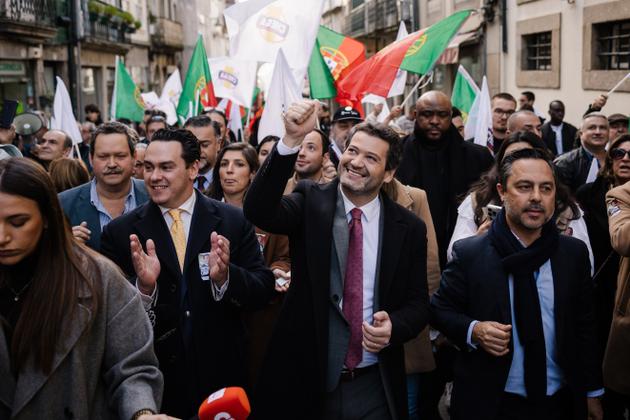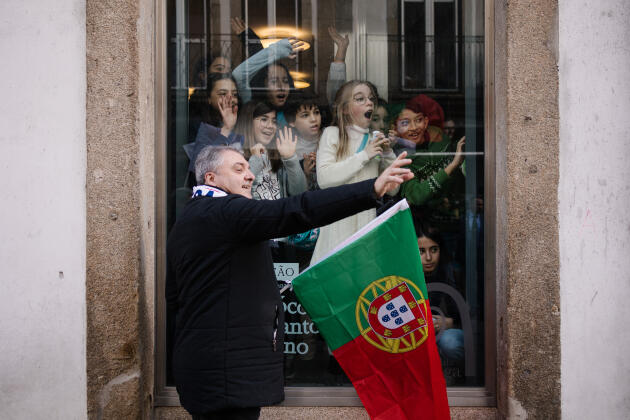


Portugal's far right on the rise as country votes in legislative elections
NewsThe Chega party is projected to receive 16% to 18% of the vote in Sunday's race, organized after the revelation of corruption scandals involving close associates of Socialist Prime Minister Antonio Costa.
Surrounded by a plethora of his party's bodyguards and elected representatives, André Ventura walked with a smile through the old town of Braga, in northern Portugal, on Tuesday, February 27. Surrounding the leader of the far-right Chega ("Enough is enough") party, some 50 supporters waved flags and chanted "Por-tu-gal" like a mantra. Margarita Paulina made no secret of her excitement. With tears in her eyes, she beckoned to Ventura, who approached her and embraced her effusively. "This is the best: The country needs an iron fist to bring order back to our small country and stop our young people leaving to seek a better future elsewhere," explained this 62-year-old retiree, whose son lives in Dubai and daughter in Switzerland. "The other political leaders keep making promises, but they do nothing."
In the streets, curious passers-by snapped photos and murmured as Ventura marched on. "I like his ideas and he's fighting against the status quo. This country needs to change its mentality and people need to wake up," asserted José Campos, a 52-year-old engineer who is still reluctant to give Ventura his vote, finding him "sometimes too aggressive." Two employees of a shoe store whisper on the landing. "He's too extreme for me, but he's right when he talks about housing and inequality," said one of them, in her 30s.


Five years after bursting onto the Portuguese political scene, Chega is set for a strong showing in the early general elections on March 10. In 2019, with just 1.3% of the vote, the party of Ventura, a former local Socialist Party (center right) elected official and ex-sports commentator, won a single seat in the Assembly of the Republic, buoyed by an anti-system, anti-Roma discourse. "Back then," recalled political scientist Patricia Lisa, "he won votes in abandoned rural areas, among people who didn't feel they were being listened to. Now he's winning among young people, who are attracted by the parties at the extremes." After climbing to 7.1% of the vote in 2022 (12 lawmakers) and introducing a radical discourse, both in form and substance, into the hitherto orderly space of the Assembly, he is now being forecast by the most cautious polls at garnering between 16% and 18% of voting intentions.
The end of the Portuguese exception, a country that has long seemed allergic to the far right, is set to be ratified on Sunday. As historian Antonio Costa Pinto, professor at the Institute of Social Sciences at the University of Lisbon, pointed out, "In reality, as soon as democracy was consolidated, after the Carnation Revolution of 1974, we knew that between 18% and 20% of Portuguese society expressed authoritarian conservative views. However, the two parties of the right, the Socialist Party and the CDS [Democratic and Social Center], which came from the moderate opposition to Salazarism, contained them. Chega ultimately arose in the context of an anti-socialist momentum − under the left-wing government combining the Socialist Party, the radical left, and the Communist Party [between 2015 and 2019], nicknamed the "geringonça," the "contraption" − and the inability of the right to return to power then."
You have 64.52% of this article left to read. The rest is for subscribers only.
